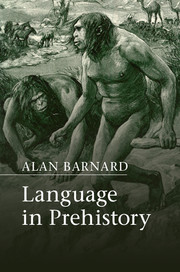Book contents
- Frontmatter
- Dedication
- Contents
- List of figures
- List of tables
- Preface
- 1 Introduction
- 2 Population diversity and language diversity
- 3 What did prehistoric people do?
- 4 How did prehistoric people think?
- 5 Narratives of the every-day
- 6 Mythological narratives
- 7 Sexual selection and language evolution
- 8 Conclusions and thoughts for the future
- Glossary
- References
- Index
1 - Introduction
Published online by Cambridge University Press: 05 November 2015
- Frontmatter
- Dedication
- Contents
- List of figures
- List of tables
- Preface
- 1 Introduction
- 2 Population diversity and language diversity
- 3 What did prehistoric people do?
- 4 How did prehistoric people think?
- 5 Narratives of the every-day
- 6 Mythological narratives
- 7 Sexual selection and language evolution
- 8 Conclusions and thoughts for the future
- Glossary
- References
- Index
Summary
Modern humans have spent little over 10,000 years as non-hunter-gatherers, but nearly 190,000 years before that as hunter-gatherers. Even if we were to date the origin of language to 50,000 years ago, that still gives us 80 per cent of our time on earth as pure hunters, gatherers and fishers, and most of this time as imaginative, talking and communicating people. I believe it was rather longer ago than this. Human beings are linguistic, evolutionarily adaptive hunter-gatherers, usually not literate, but with the same minds as those possessed by, as the famous anthropologist Claude Lévi-Strauss (1968: 351) once put it, a Plato or an Einstein.
This book is about the origins of language and its evolution. The key difference between it and most other books on the subject is that it is written by an anthropologist rather than by a linguist. It therefore looks at the problem a little differently. The problem, however, is that there exists no direct evidence for the origin and evolution of language, so we have to infer it from the wealth of material we do have from archaeology, from studies of language acquisition by children, from comparative studies of language diversity and so on. My specialization happens to be hunter-gatherer studies, so I have tried also to bring some of my knowledge of such people to bear on language evolution. In my own fieldwork, as well as in my reading, I have tried to understand hunter-gatherers in their own terms. How do they, as non-literate people, see language? What do they use it for? Are they ignorant of grammar, or have they got so much grammatical sense that they delight in playing games with it? Indeed, are they more grammatically sophisticated than those in the West? Like a Plato or an Einstein, do they spend their time exploring the intricacies of philosophical or scientific problems? Or indeed grammatical ones? The answer to that, it may surprise some, is a qualified ‘yes’.
In this book I make a number of assumptions. First, I know that hunter-gatherers are just as intellectually sophisticated as I am. I know that they are interested in grammar, and that the grammar of their languages is as complex as those of non-hunter-gatherers. Furthermore, possessing just one language is very unusual for them. Typically, individual hunter-gatherers can speak many languages.
- Type
- Chapter
- Information
- Language in Prehistory , pp. 1 - 16Publisher: Cambridge University PressPrint publication year: 2016



